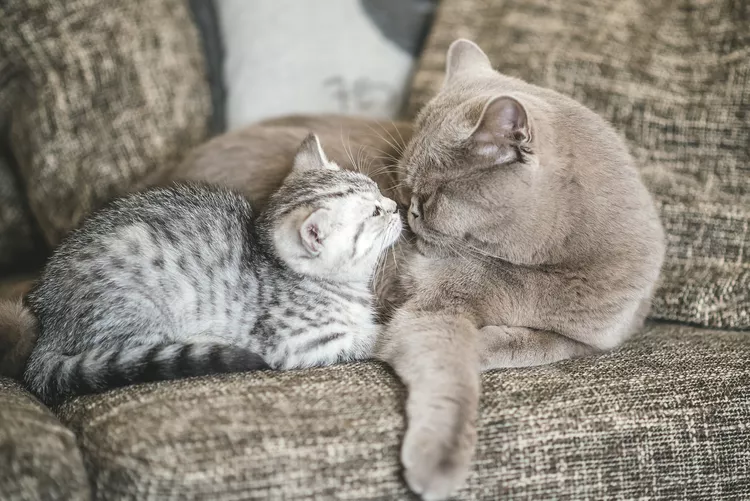How Old Is My Cat in Human Years?

It's a known fact cats develop and age rapidly. While we may wish our kittens and adult cats could live as long as we do, cats develop differently than humans. For example, by 1 year of age, kittens are as mature as a 15-year-old human child, while a four year old cat is in the prime of their life as the equivalent of a 32-year-old in human.
While the rapid maturity of cats may be shocking, even relatively long-lived cats do not live as long as we would like them to. On the plus side, the relative age of cats can depends on factors including genetics, diet, lifestyle, and veterinary care. Although cat owners cannot control much when it comes to heredity, we can make positive choices for our pets when it comes to the other factors.
- 01 of 04
How Long Does the Average Cat Live?
A cat's lifespan varies with lifestyle and genetics. With optimal health and good genes, a well-nourished and well-exercised indoor-only cat will typically live longer than indoor-outdoor cats. According to a college of veterinary medicine, the average lifespan for indoor only cats is 10-15 years. With that said, indoor-outdoor cats usually live longer than strays and ferals. While this is simply the average, there are always exceptions to every rule.
- 02 of 04
How Is a Cat's Age Determined?
You may be wondering how exactly a cat's approximate age is determined. Perhaps you have taken in a stray cat that you have been feeding for several weeks, and are curious how old the cat is and what to look for. While looking at a cat's teeth is often a good indicator, it is not a foolproof method. For that reason, veterinarians prefer to examine the whole cat. In addition to looking for wear along the teeth, veterinarians will examine for any signs of cloudiness to the lenses of the eyes. They will also check for signs of grooming issues as older cats can be less thorough due to dental issues or weight gain. Lab work can show changes in organ function that are more common with age (e.g. kidney disease or hyperthyroidism). Keep in mind your veterinarian is making an educated guess as to your cat's age; there isn't one specific way of determining a specific age unless the birthday is known.
- 03 of 04
How to Convert Cat's Age to Human Years
You can understand your cat's development more easily if you have a general idea of his age in human years.
Variables such as genetics, diet, environment, and access to routine preventative medical care can alter your cat's comparative human age. Although you might not have any control over the cat's heredity, you do have options for controlling the other factors which control your cat's aging process.
- 04 of 04
Cats Age Conversion Chart
The International Cat Care organization created an accurate method for people to learn the comparative age of their cat to human years through a conversion chart. They also created specific guidelines for categorizing felines into life stages, and recently added two additional life stages, which effectively "borrow" some time from one stage and add it to another:
1. Kitten, from birth to six months old
2. Junior, from six months to two years old
3. Prime, from three years to six years old
4. Mature, from seven to 10 years old
5. Senior, from 11 to 14 years old
6. Geriatric, from 15 years and olderUse the Cat Age Conversion Chart to easily determine your cat's approximate age in human years.